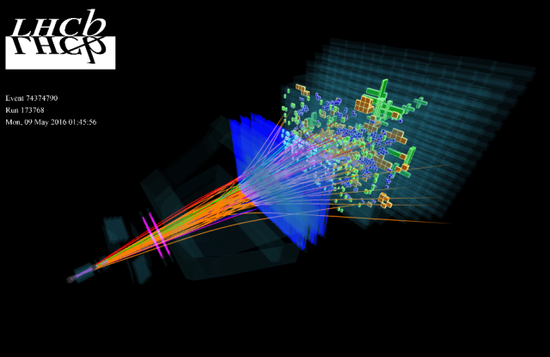(单词翻译:单击)
Particles can come into being and be gone again in as little as 0.000000000000000000000001 second (10-24). Even the most sluggish of unstable particles hang around for no more than 0.0000001 second (10-7).
粒子可以在短达0.000 000 000 000 000 000 000 001秒(10的负24次方秒)时间里出现和消失。连最缺乏活力的不稳定的粒子,存在的时间也不超过0.000 000 1秒(10的负7次方秒)。
Some particles are almost ludicrously slippery. Every second the Earth is visited by 10,000 trillion trillion tiny, all but massless neutrinos (mostly shot out by the nuclear broilings of the Sun), and virtually all of them pass right through the planet and everything that is on it, including you and me, as if it weren't there. To trap just a few of them, scientists need tanks holding up to 12.5 million gallons of heavy water (that is, water with a relative abundance of deuterium in it) in underground chambers (old mines usually) where they can't be interfered with by other types of radiation.
有的粒子几乎捕捉不到。每一秒钟,就有1万亿亿亿个微小的、几乎没有质量的中微子抵达地球(大多数是太阳的热核反应辐射出的),实际上径直穿过这颗行星以及上面的一切东西,包括你和我,就仿佛地球并不存在。为了捕捉几个粒子,科学家们需要在地下室(通常是废矿井里),用容器盛放多达57000立方米重水(即含氘相对丰富的水),因为这种地方受不到其他类型辐射的干扰。
Very occasionally, a passing neutrino will bang into one of the atomic nuclei in the water and produce a little puff of energy. Scientists count the puffs and by such means take us very slightly closer to understanding the fundamental properties of the universe. In 1998, Japanese observers reported that neutrinos do have mass, but not a great deal—about one ten-millionth that of an electron.
在非常偶然的情况下,一个经过的中微子会砰地撞击水里的一个原子核,产生一丁点儿能量。科学家们通过统计有几个一丁点儿而逐步了解宇宙的基本性质。1998年,日本观察人员报告说,中微子确有质量,但是不大──大约是电子的一千万分之一。
What it really takes to find particles these days is money and lots of it. There is a curious inverse relationship in modern physics between the tininess of the thing being sought and the scale of facilities required to do the searching.
如今,寻找粒子真正要花的是钱,而且是大量的钱。在现代物理学中,寻找的东西的大小,与所需设备的大小,往往有意思地成反比关系。


